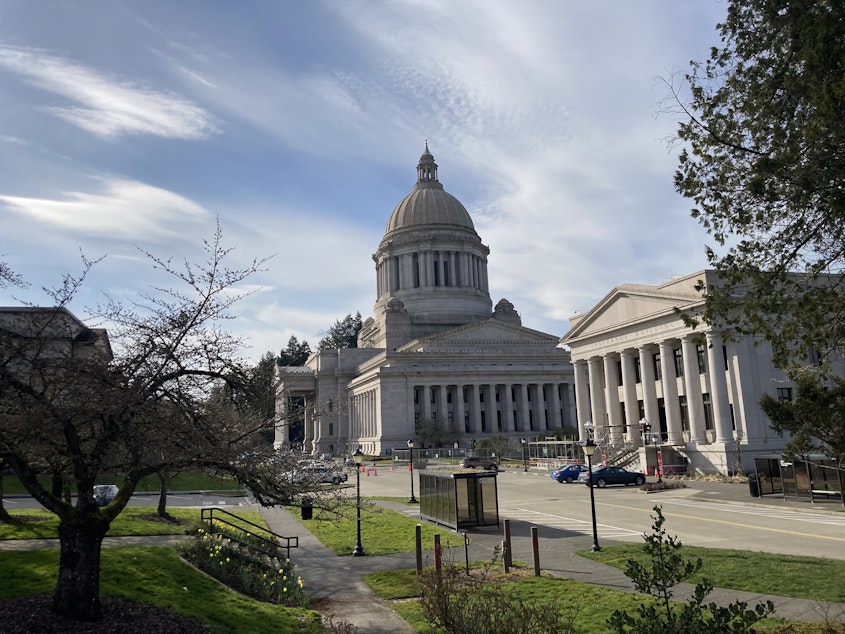Battle over Washington’s budget looms as revenue picture improves

Last June, Washington’s chief revenue forecaster delivered the bad news to state lawmakers and state officials.
“The longest economic expansion in U.S. history is, unfortunately, over. We are now in a recession,” Steve Lerch told the state’s Economic and Revenue Forecast Council.
At the time, Lerch projected the state would lose nearly $9 billion in revenues over four years. But he also emphasized there was a lot of uncertainty in the forecast.
Sure enough, the September and November forecasts weren’t nearly as bleak. Taken together they reduced the almost $9 billion drop to a projected $3.3 billion reduction.
Then came Wednesday's March revenue forecast. It showed the state returning to pre-pandemic revenue levels.
“In revenue terms, we are very close to being back to where we expected to be in February [of last year],” Lerch said.
Washington’s improving fiscal picture isn’t an anomaly. A recent New York Times analysis shows that nearly half of states saw their revenues increase from April to December of last year. And many more experienced only slight declines. A key factor was federal aid that allowed even laid off workers to keep spending. Now, more federal money is headed to states from the latest stimulus package.
In Washington, stronger than expected retail sales and a robust housing market are two key factors driving the positive revenue forecasts.
The state is now expected to take in an additional $3.3 billion through the next two-year budget cycle, compared to the previous forecast, for a total of $56.6 billion for the 2021-23 budget cycle.
In addition, Washington is in line to receive $4.2 billion in the next round of federal stimulus funds
Sponsored
There’s also $1.8 billion in the state’s rainy day fund.
“Unlike what we thought six or eight months ago, we are flush in every possible way,” said Senate Republican Leader John Braun this week.
By calling the state flush with cash, Braun is setting the stage to argue that new taxes aren’t necessary to balance the budget.
Meanwhile Democrats, who hold the majorities in both the House and Senate, frame the situation differently. While acknowledging the state is in a good fiscal position, they note that many families across Washington are still struggling from the fallout of the pandemic.
“Everyday working Washingtonians are not seeing these economic gains that are largely being realized by folks that already have means,” said House Appropriations Chair Timm Ormsby after the forecast was released. “In order to be able to make sure that this recovery is widespread, we have to fashion budgets that address that issue.”
Sponsored
The talk of taxes is happening against the backdrop of writing Washington’s next two-year budget. That job falls to House and Senate Democrats since they hold the majorities and they’re expected to release their respective budgets next week. Democrats say more funding is needed for things like behavioral health, substance use treatment and childcare.
Senate Democrats have already passed a bill that would impose a state capital gains tax on profits over $250,000 from the sale of such things as stocks and bonds. The tax would bring in about $500 million a year, which could be used to expand access to early learning and child care.
That bill now appears to be on a fast track in the House where it got a public hearing this week.
Speaker of the House Laurie Jinkins views the capital gains tax as a way to make Washington’s tax system less regressive.
“The way I think we do that this year is by using [the] cap gains [tax] to actually fund our working families tax credit,” Jinkins said.
Sponsored
That’s a credit for lower-income families to offset the state taxes they pay. It’s something that both Democrats and Republicans support this year. But Republicans want to fund it without raising taxes.
State Representative Ed Orcutt is a staunch tax opponent and the ranking Republican on the House Finance Committee. He calls the capital gains tax volatile.
“Right now is not the right time for a number of reasons to be adding any new taxes, especially one that’s this unstable,” Orcutt said.
Democrats are also looking at taxes on sugary drinks or health plans to fund foundational public health.
Republicans are not only saying “no” to new taxes, they want the Legislature to consider tax breaks. Last month, Senate Republicans released a minority budget proposal that called for the elimination of the state’s business and occupation tax with the goal of jumpstarting the manufacturing sector.
Sponsored
“We’ve lost 70,000 jobs over the course of the last 20 years in that field,” said state Sen. Lynda Wilson, the ranking Republican on the Senate Ways and Means Committee. “I think that that would be an excellent place for us to reduce our taxes.
Republicans also say the state should consider cutting property taxes.
The chair of the Senate Ways and Means Committee, Democrat Christine Rolfes, agrees the state is in a “really strong place.” But she warns against both big increases in spending or big tax cuts.
“I’m just offering some caution to folks. I’m urging a steady course here,” Rolfes said.
Copyright 2021 Northwest News Network

